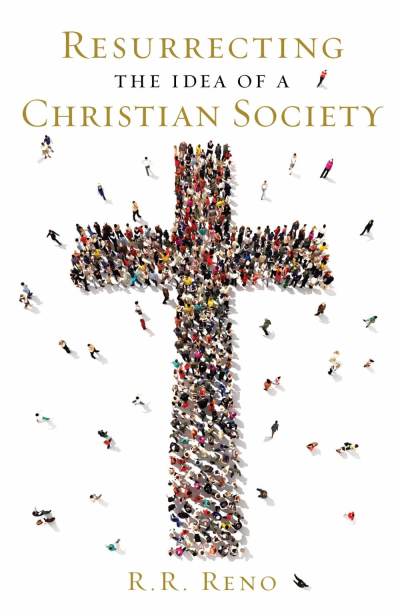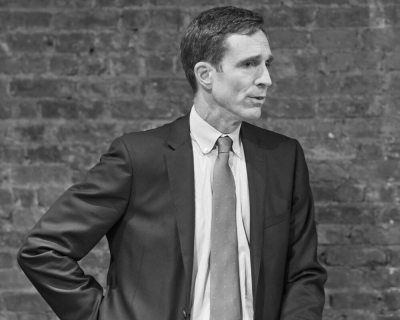Society Will Break Down Unless There Is Christian Renewal in America, R.R. Reno Says (Interview, Part 1)

In an age where police are being murdered in the streets and biological sex is seen as an oppressive social construct, a renown writer is arguing America needs Christian renewal of our society or it will break down.
R. R. Reno, editor of First Things and a leading scholar of religion and politics, warns in his new book, Resurrecting the Idea of a Christian Society, that America's post-Christian culture is leading to our enslavement by the state.
Reno also outlines why the alarming rise in poverty rates is due to a decline of faith, how secular liberalism most adversely impacts the poor, and why the government will continue to control more areas of life unless Christianity's public influence is restored.
The following is an edited transcript of CP's part one interview with Reno, which will be followed by part two.
CP: What was your inspiration to write "Resurrecting the Idea of Christian Society," and given the rising millennials — some call them the "selfie generation" — how can American Christians connect their faith to a larger vision for society when we are beset by rampant individualism?
Reno: The immediate inspiration is T.S. Eliot's essay "The Idea of a Christian Society." His essay had its origins in lectures he gave in 1939 and Western culture faced a great crisis there, communism, fascism and Nazism. Eliot saw those as pagan in the sense that they saw nothing more than man's material existence as the essence of life. He recognized that liberal democratic societies are not neutral but they have a different spiritual orientation. That spiritual orientation, he thought, was, by default, Christian. So Europe faced a choice whether it was going to be a pagan society or a Christian society. And I think we face the same choice.
Our paganism is much more modest. It comes inside as a matter of choice, but it's a paganism of wealth and pleasure. So I see those as our pagan gods.
So I would say that I don't think millennials are individualistic. Quite the contrary, I see them as pretty conformist but because they more than their parents worship the gods pretty clearly of health, wealth and pleasure.
People who are 30 are far more anxious about their career than people of my generation. Because the gods of health and wealth are very demanding gods. I mean, it wouldn't have occurred to me when I was a college student to worry about what I was eating. And I've been at coffee shops here in New York and been behind young people who interrogate the barista as to the content of various pastries.
CP: You write extensively about raising up the poor and how moral breakdown affects them the most, and you urge Christians to resist nonjudgmentalism. What counsel can you give to believers who do not want to bow to the spirit of the age and relinquish moral standards? Many have left the Christian faith in part because of church environments where they experienced a rather harsh judgmentalism.
Reno: This is a thorny topic, isn't it. I make the argument in my book that nonjudgmentalism is an effort to make our moral code as flexible as possible and that this can work well for people who are very skilled at navigating in a very fluid world. So if you have good verbal skills and are able to sort of talk through your feelings and aspirations, you might be able to comment on what's known as healthy choices.
But it's very tough on people who don't have those social or educational advantages so they are deprived of those guard rails for their lives and clear signposts in the stages of life. So that contributes to the social dysfunction of the poor.
Increasingly we are aware that moral and cultural dysfunction is as severe as the economic dysfunction. As Christians, we know that nobody likes to be told that having a child out-of-wedlock is sinful. Upper-middle class Christians in particular tend to think everybody can be happy. We can lower the judgment without hurting anybody because after all, whose hurt? If we just be more accepting of single women and children.
Now, of course, Christianity is accepting precisely insofar as you repent of whatever sin you are accepted and affirmed. But that's not how judgmentalism works. [Non-] judgmentalism is "well, there's nothing really wrong with it." And so, my argument in my book is that we have to recover confidence in basic moral truths in order to actually have a society that is good for the most vulnerable people in our society.

CP: In your chapter about limiting government you argue that local institutions have been thinning — you give an example saying that is easy to imagine a dock worker in Baltimore being a part of his church and an active member of his community decades ago but now it is difficult to conceive of this, so what it the most significant factor driving the erosion of localist politics and institutions and what can Christians do to rebuild them?
Reno: There are many causes. But one that is often neglected is our meritocracy. We tend to decapitate local communities by sucking the most talented members, the people most likely to be local leaders into a national meritocratic system, now an increasingly global one.
Another factor is the decline of marriage and the rise of the entertainment culture that is atomizing, whether it's computer games or TV or Facebook, or whatever. In the earlier days people had to go outside in order to be entertained so a lot of the civic organizations functioned as entertainment. You know, you work 40 hours a week and you don't want to go home and you have beers at the Sons of Italy club.
So I think it's multi-causal, there's no one cause. But I think churches are really crucial here because churches are intrinsically local institutions in the sense that you can't worship virtually. So you gather and Christianity, by nature, is community-building. Which is why, even in the worst circumstances often the only functional institutions are church-related ones. So Christians have to put their shoulder to that, to their own institutions.
And one of the problems is that Christianity is increasingly a college-educated phenomenon. So one the few declines in churchgoing is among working-class people so I think churches need to put efforts of church planting and evangelization in the communities that are most in need of community building, a moralizing function of faith.
CP: You spend a great deal of time describing what you call "Post-Protestant WASPS," these are well-off secular liberals who largely reject transcendent things but the fervor with which they advocate for their beliefs could almost be called religious and their views impregnate so much of American culture and many are at the helm of important institutions. Without God, what ultimately motivates them?
Reno: Well, I think that liberal Protestantism throughout the 20th century was a very moralistic enterprise. The social gospel movement turned attention away from heaven above and towards building a better society here and now and that this worldly character of mainline Protestantism was a powerful force for two-thirds of a century, culminating with the Civil Rights Movement, and the anti-war movement which the mainline Protestant churches, at least the clergy, were involved in.
And then, those churches have collapsed as institutions but that spirit has endured, that moralizing progressive spirit in the institutions that were dominated by mainline Protestants, which really means all of the elite education in the United States. I can't think of a single elite school in the United States that is not a formerly mainline institution.
Some of them were founded to be secular, like Johns Hopkins University, and to a lesser extent University of Chicago. But even a place like Cal-Berkeley, if you look at the history of Cal-Berkely, I guarantee you that in the 1910s and 1920s there was a lot of rhetoric there about the school training Christian gentlemen, and people committed to the Christian future of America, and things like that. By which was meant, a progressive do-goodism.
This is not characteristic of universities in Europe or of the European elite. Our elite is typically more moralistic and more pragmatic. And I would argue that President Obama is a paradigmatic Post-Protestant WASP. For me that was very helpful to see that there is a kind of continuity in our ruling class, it's a discontinuity because it's no longer hereditary or ethnic, although it is still dominated by white folks. But its culture has remained very strong and continuous.
I mean, go to Concord, Massachusetts, the birthplace of Ralph Waldo Emerson and Henry David Thoreau, Nathaniel Hawthorne is buried in a cemetery there. That kind of high Emersonian, Thoreauvian kind of high, spiritualized moralism is still very much active there. The local Unitarian Church there — I was in Concord recently — has a big Black Lives Matter banner out in front even though there's probably not a single black person living in Concord.
So they're well to do, successful, liberal and they want to be on the "right side" of the big issues in our country.





























